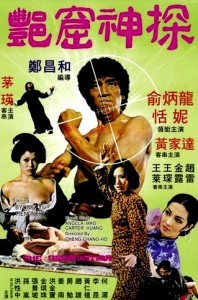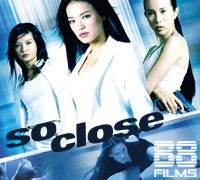Director: Chung Chang Wha
Cast: Tien Ni, Yue Bing Lung, Angela Mao, Zhao Lei, Suen Lam, Chiang Nan, Fang Mien, Sammo Hung, Wang In Sik, Chiu Hung, Lee Kwan, Wilson Tong, Carter Wong, Simon Yuen, Yuen Wah, Naomi Oka, Hung Sing Chung
Running Time: 87 min.
By Paul Bramhall
The career of Korean director Chung Chang-wha makes for an interesting read. Chang-wha made his directorial debut in 1951, and went on to make movies for several decades in his native Korea, including winning best director for the movie A Horizon. However on an international scale, most people only know his work from the nine year period spanning 1969 – 1977, when thanks to being signed up by the famous Shaw Brothers studio, he began making movies in Hong Kong.
During this relatively short period he cranked out a total of 11 movies, some of which would instantly become landmarks of the kung-fu cinema genre. In 1972 he made King Boxer with Lo Lieh, which is generally considered to be the first kung-fu movie to break out into the international market. In 1974 he directed The Skyhawk, which featured Kwan Tak Hing take on the role of Wong Fei Hung. Tak Hing had played Fei Hung in over 100 movies since the mid-1940s, before stepping down in 1970, however The Skyhawk proved so popular it became somewhat of a comeback vehicle, and he’d reprise the role of Fei Hung for several movies over the coming years. Chang-wha’s last movie in Hong Kong was Broken Oath, an Angela Mao starring re-telling of the Japanese movie Lady Snowblood, and the movie that a lot of Mao fans sight as her best.
Amongst all these classics, we have The Association, which is essentially the elephant in the room. Having switched from Shaw Brothers to fledging movie studio Golden Harvest, Chang-wha seemed to turn his attention to directing gritty crime thrillers, such as The Devil’s Treasure and The Double Crossers. The Association was made between these movies, and was originally intended to be a two part crime epic, teaming him up with his fellow countrymen Byong Yu and Hwang In-shik, both masters in the Korean art of Hapkido, as well as being shot in Korea.
Sadly, things went wrong along the way. The story, which focuses on a welfare agency for young women actually being a cover-up for a prostitution and abortion (not necessarily in that order) ring, features a fairly heavy dose of exploitation, which comes in the form of liberal helpings of female nudity. Byong Yu, who as it would turn out would make his first and last screen appearance in The Association, despite being the main character, wasn’t entirely comfortable with the more sleazy elements of the production, and ultimately would buy out what was planned to be the first part, preventing it from being released. So The Association is in fact the second part to what was originally a much bigger tale, patched together so that it runs as coherently as possible.
So, what exactly is left? Well, as the movie opens we’re given a credits sequence which features exploding skulls, so straight away it had my favor just for putting a smile on my face. Who wouldn’t want exploding skulls in the opening credits, especially when they have exactly zero relevance to the next 90 minutes. Before long we have Angela Mao and Byong Yu throwing down against each other, which happens to take place in the exact same patch of cleared forest Casanova Wong and Leung Kar Yan would square off 3 years later during the opening credits of Warriors Two.
Things aren’t as well as they seem though, Mao and Yu are actually a loved up couple, and the fight is just playful sparring, but alas it’s just a flashback. In present day, Yu, an upstanding police officer, has had to arrest Mao for killing an official, and we’re introduced to him tying her to a pole for execution via a death squad. Before going on her way, she is kind enough to confide in him that there’s no hard feelings, he did what he had to do, but she assures him that the official she killed was corrupt, and part of something much bigger. Yu, confident his girlfriend who he’s about to have shot is telling the truth, promises her he’ll get to the bottom of it, so at least her death won’t be in vain.
This somewhat bizarre tone permeates throughout the rest of the movie, as it becomes increasingly clear that The Association is in fact not a kung-fu movie at all, but rather it shares much more in common with the sleazy European exploitation movies of the same period. The only difference is this one just happens to have some A grade martial artists busting out the moves at infrequent intervals during its runtime. This is perhaps no more obvious than when Yu, sent on a mission to protect the wealthy Tien Ni who’s become a target for some marauding thieves, explains he’ll sleep in the closet of her bedroom for the next month until they decide to attack. Because in The Association, this type of thinking makes perfect sense. Taken with this approach, there is enjoyment to be found. It’s not enjoyment that the film-makers intended, and it’s certainly not enjoyment from the fights, however taken as a piece of “so bad it’s good” cinema, there are laughs to be had.
There’s probably no other movie out there which features martial arts legends Sammo Hung and Hwang In-shik sharing the same screen with a tied up woman being interrogated by having electric voltage conductors being pinched to her nipples. But The Association has it. There’s probably no other movie out there which features a dark and foreboding abortion ceremony, with a naked woman laying on a table surrounded by black hooded figures, in a scene which is juxtaposed by the camera constantly cutting away to so close they’re almost blurry shots of the woman’s breasts. But The Association has it. There’s probably no other movie out there that would dare to be so bold as to, in the exact same scene, suddenly change the soundtrack to a several minutes long (literally) go-go dance tune, and have the evil blonde haired western actress, adorned in see through lingerie, proceed to energetically dance around the naked patient for no reason whatsoever. But you guessed it, The Association has it.
It’s a movie filled with such scenes, each one of them generating an equal amount of head scratching and laughter, and complimented with some sort of alcoholic beverage, the movie is a lot of fun. On the flip side, for the martial arts fan, people expecting to see the amazing skill of Byong Yu in his only movie appearance, the ferocious kicks of Hwang In-shik, or the talents of Sammo Hung and Angela Mao, will probably be left reaching for an alcoholic beverage for entirely different reasons.
The Association is not without fight scenes, Yu and In-shik go toe-to-toe on a couple of occasions, and there’s a satisfying opening fight with Mao, which has some nice use of slow motion that captures the intensity of those famous facial expressions of hers in a way which I haven’t seen previously. However there’s nothing outstanding here, and it’s worth pointing out that the movie lacks any kind of final fight, in part due to the rather left of field exit of Yu’s character (it made me wonder if this was filmed after Yu bought out the first part, so was done as an act of revenge by Chang-wha). For some cheap thrills though, The Association is worth a look.
Paul Bramhall’s Rating: 6/10




